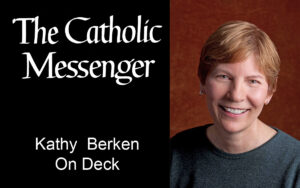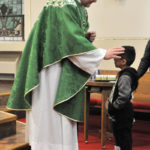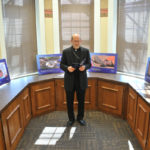 By Kathy Berken
By Kathy Berken
On Deck Column
On Feb. 20, I slipped on the ice in my parking lot and fractured my right arm just below the shoulder. I suspect it will take a while to get back to normal again. As a writer, I will take any event in my life as fodder for a story or two. The broken arm is no exception. I witnessed the kindness of everyone who helped from the moment my daughter Erica found me on the ground, to the exceptional paramedics and EMTs in the fun ambulance ride to the hospital, to every healthcare worker I’ve met within the last several weeks. They were all divine lights of compassion.
Storytelling is the focus of a Zoom book study I’m leading for a Canadian group centered on the spirituality of our later years. “Growing In Wisdom” is an offshoot of the two-year “Forest Dwelling” program I completed that hails from the Oblate School of Theology in San Antonio, Texas where Father Ron Rolheiser is president-emeritus.
The book we are studying is “Remembering Your Story: Creating Your Own Spiritual Autobiography,” revised edition, by Richard L. Morgan. Using seven foundational principles of spiritual autobiography, Morgan offers practical suggestions for creating a life story that goes far beyond a simple chronology.
The first principle is “Every life is a unique, invaluable story.” Never think that any event is insignificant. As you have seen from most of my columns over the past 10 years, I can find spiritual meaning in almost any event. On the day of my accident, Erica brought me to her house where my 5-year-old granddaughter Isabelle rushed to the table to create a card for me, complete with a cutout heart. A true God-moment.
Second, Morgan reminds us, “God speaks to us in our stories.” At the beginning of all the retreats I work, I tell participants that my prayer for them is that at some seemingly insignificant moment they will be able to state without equivocation, “I am in the presence of God!” Use that moment to tell the story around it.
Third, “Connecting our stories with God’s story is the work of the Spirit.” In real-life terms, God’s story is about love and mercy and my story of the paramedic who cared for me in the ambulance was a part of the work of the Spirit.
Fourth, “Painful memories can be healed through stories.” If you remember, I wrote a column at the height of the “Me-Too” movement about my childhood experiences with a predator. Sharing a painful memory in a safe space can be healing.
Fifth, “Remembering our stories creates community and the future.” This is the crux of the importance of telling our stories, either in writing or video or audio recording. How many of us would love to have stories from our grandparents or other relatives to share with the rest of our family? Telling and documenting our stories keeps family connections alive.
Sixth, “Faith stories are the legacy we leave.” Our stories can be specifically about our faith life in the Church, our relationship with God and the saints and the ways in which we pray.
We expand that faith through our lived spirituality, which leads directly to Morgan’s last principle: “Stories create meaning . . . at any age.”
The card that Isabelle gave me means that she is a compassionate person, she is living God’s story and her loving actions increase the meaning in our family life and offer hope.
I invite you to spend time recording your favorite stories, with or without Morgan’s book. The 100 questions he poses are worth the purchase. Answer one question a day, one God-story at a time, written out or recorded into your phone. Your family will be grateful!
(Kathy Berken is a spiritual director and retreat leader in St. Paul, Minnesota. She lived and worked at L’Arche in Clinton — The Arch from 1999-2009.)











